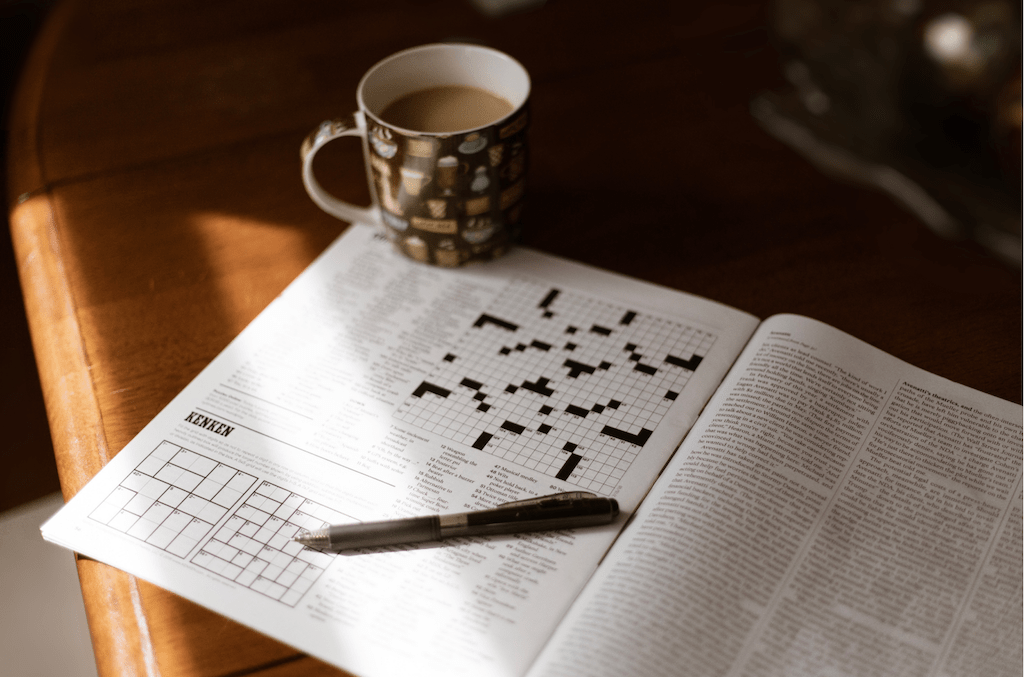
Ideal for giving your brain a much needed workout during the current downtime.
It is believed that the very first crossword puzzle came to be in 1913, but it’s in 2020 that the beloved game really came into its own. We’re sure we don’t have to explain why.
For those who have spent lockdown struggling against the Guardian’s Quick Crossword or the Times’ notoriously difficult Cryptic Crossword, some reassurance; according to science, doing crossword puzzles may actually make you smarter, and doing one daily could even prevent the onset of Alzheimer’s, help develop problem solving skills and keep your brain sharp. In theory, then, the more you attempt – or, whisper it, complete – the easier they should become!
If you’re struggling to conquer your latest crossword, then don’t give up. Instead, apply these 7 tips and tricks for solving crossword puzzles, IDEAL for giving your brain a much needed workout during the current downtime.
EXPAND YOUR KNOWLEDGE
Firstly, and before you pick up your pen and enter the grid, it’s vital to have a decent grasp of general knowledge under your belt. It’s not uncommon to see a crossword clue or two within each puzzle concerning current affairs, historical events, celebrity trivia or facts about landmarks, capital cities, countries and so on.
As such, improving your crossword skills is as much about expanding your knowledge as it is your vocabulary.
GO TO BED WITH A THESAURUS
That’s not to say that expanding your vocabulary isn’t crucial to continued crossword improvement. Perhaps the easiest way to do this is by reading more (ideal for taking in that trivia, too!) and passively accruing words as you go. Cross-referencing phrases you’re unfamiliar with, both in a dictionary and then checking out synonyms in a thesaurus, will help you better contextualise any new vocabulary you come across.
There are also apps out there designed to help you learn new vocabulary in a gamified way. If this sounds like your sort of thing, then check out Words With Friends, Reverse Dictionary or PowerVocab. If you’re taking this thing seriously, then also consider subscribing to a variety of the current Word of the Day newsletters available.
Playing classic games such as Scrabble and even doing word searches are other useful ways to improve your vocabulary.
DON’T BE ASHAMED TO GET A BIT OF HELP
It’s the journey rather than the destination, here, and the process of completing a crossword is often more fulfilling than actually, you know, completing it.
If you do get stuck, or are a couple of clues short of success, then there’s no shame in seeking help in the name of self-improvement and learning. Rather than simply cheating, of course.
Many of the national newspapers offer a phone number to call below the crossword puzzle which reveals answers on request. Do be warned that these can be expensive; the Guardian’s daily help hotline below the Quick Crossword, for instance, costs £1.10 per minute, plus your phone company’s access charge. Alternatively, you could simply wait until the next day, when the answers are published.
Online crossword puzzles can offer even faster, free options to check your answers. Simply searching your clue + the search term ‘crossword clue’ will reliably reveal the answer.
A PREVALENCE OF VOWELS
Should you have the majority of letters for a clue, then the likelihood of those missing being vowels (a, e, i, o, u) is high. There will always be at least one vowel in the clue, and usually several if the word is longer, so prioritise these most common letters when you’re feeling a little flummoxed.
IDENTIFY THE CLUE’S WORD FORM
In the vast majority of crosswords, the clue’s word form (as in, whether it’s a verb, adjective, noun, adverb…) will correspond with the answer’s word form. Working this out is the first step to finding the answer!
TENSES, PLURALS & OTHER WORD ENDINGS
Another trick you need to pay attention to is what tense the clue is written in. If it’s written in the past tense, for instance, then this means the answer will need to be in the past tense, too. What’s more, identifying that the clue is in the past tense will generally give you the final two letters – ‘ed’.
Go further; you can establish way more about the endings of your answers. When it comes to crossword clues, they generally specify what kind of word it is. For example, if it’s a plural word, then this is specified. This will make life much easier for you because you know that it will probably end with the letter ‘s’, and this opens up a clue for the next word as well.
Get familiar with the most common suffixes (word endings) in the English language to help you establish the patterns and rhythms of the grid. ‘Ing’, ‘al’, and ‘tion’ are just a few; check out a more extensive list here.
SMALL WORDS
You’ll always find different lengths of words in the crossword puzzle, so one strategy to help you work faster is to start with the smaller words, gradually shining a light on the darker corners of the grid as you alight on the answers. These smaller words, made up of three, four, or five letter words will always contain vowels in the middle letters. Hey, it’s easy when you know how!
